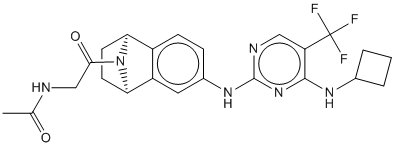All AbMole products are for research use only, cannot be used for human consumption.

PF-03814735 is a novel, potent, orally bioavailable, reversible small-molecule Aurora kinase inhibitor with IC50 of 0.8, 5, 10 and 22 nM for Aurora 1, Aurora 2, Flt 1 and FAk, respectively. Aurora kinases are serine- threonine kinases that play essential roles in mitotic checkpoint control during mitosis. PF-03814735?possesses potential antineoplastic activity. Aurora kinase inhibitor PF-03814735 binds to and blocks Aurora kinases A and B, which may result in the prevention of cellular division and proliferation in tumor cells that overexpress these kinases. In intact cells, the preventive activity of PF-03814735 on the Aurora1 and Aurora2 kinases attenuates levels of phospho-Aurora1, phosphohistone H3, and phospho-Aurora2. PF-03814735 generates a block in cytokinesis, leading to prevention of cell proliferation and the formation of polyploid multinucleated cells. Although PF-03814735 generates significant prevention of several other protein kinases, the predominant biochemical effects in cellular assays are consistent with inhibition of Aurora kinases. Once-daily oral injection of PF-03814735 to mice bearing human xenograft tumors generates an attenuation in phosphohistone H3 in tumors at doses that are tolerable and that result in significant inhibition of tumor growth. The combination of PF-03814735 and docetaxel in xenograft mouse tumor models shows additive tumor growth inhibition. PF-03814735 is originally developed by Pfizer. The phase I clinical trials for the treatment of solid tumors has been completed.
| Cell Experiment | |
|---|---|
| Cell lines | HCT-116 cell |
| Preparation method | Growing cell lines in appropriate media and evaluating after 48 h of exposure to either PF-03814735 or vehicle, followed by cell number determination in a Coulter Counter. Proliferation (as measured by an increase in cell number) is expressed as a percent of untreated controls. To evaluate the PF-03814735 exposure time required for antiproliferative activity, culturing HL-60 cell cultures in RPMI medium supplemented with 15% heat-inactivated fetal bovine serum and exposing them to various PF-03814735 concentrations for 4, 8, 12, 24, and 48 hours, followed by a washout step and incubation with growth media without PF-03814735 for the remainder of the 72-h assay period. Evaluating continuous exposure to PF-03814735 for 72 hours . Determining cell counts by a Coulter Counter. |
| Concentrations | 300 nM |
| Incubation time | 4, 8, 12, 24, 48, or 72 hours |
| Animal Experiment | |
|---|---|
| Animal models | HCT116 tumors are implanted s.c. on the right flank of nude mice. |
| Formulation | PF-03814735 is formulated as a solution in cremophor EL [cremophor/ethanol/0.9% saline (12.5%/12.5%/75%)]. |
| Dosages | 10, 20, 30 mg/kg |
| Administration | Administered orally |
| Molecular Weight | 474.48 |
| Formula | C23H25F3N6O2 |
| CAS Number | 942487-16-3 |
| Solubility (25°C) | DMSO |
| Storage |
Powder -20°C 3 years ; 4°C 2 years In solvent -80°C 6 months ; -20°C 1 month |
| Related Aurora Kinase Products |
|---|
| Phthalazinone pyrazole
Phthalazinone pyrazole is a potent, selective, and orally active inhibitor of Aurora-A kinase with an IC50 of 0.031 μM. |
| Aurora Kinases-IN-4
Aurora Kinases-IN-4 is a covalent and ATP competitive aurora kinase A inhibitor (IC50: 1.7 nM). |
| Derrone
Derrone, a prenylated isoflavones, is an Aurora kinase inhibitor, with IC50 values of 6 and 22.3 μM against Aurora B and Aurora A, respectively. Derrone shows anti-tumor activity. |
| CD532 hydrochloride
CD532 hydrochloride is a potent Aurora A kinase inhibitor with an IC50 of 45 nM. CD532 hydrochloride has the dual effect of blocking Aurora A kinase activity and driving degradation of MYCN. CD532 hydrochloride also can directly interact with AURKA and induces a global conformational shift. CD532 hydrochloride can be used for the research of cancer. |
| Aurora kinase inhibitor-2
Aurora kinase inhibitor-2 is a selective and ATP-competitive Aurora kinase inhibitor with IC50s of 310 nM and 240 nM for Aurora A and Aurora B, respectively. |
All AbMole products are for research use only, cannot be used for human consumption or veterinary use. We do not provide products or services to individuals. Please comply with the intended use and do not use AbMole products for any other purpose.


Products are for research use only. Not for human use. We do not sell to patients.
© Copyright 2010-2024 AbMole BioScience. All Rights Reserved.
